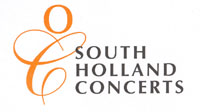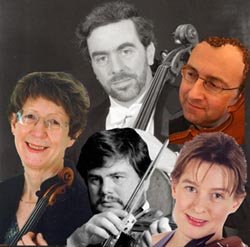Programme
String Quintet in A major op
.18 - Felix Mendelssohn (1809-1847)
Allegro con moto
Intermezzo. Andante sostenuto
Scherzo. Allegro di molto
Allegro vivace
Written in 1826, this music is the work of an amazingly
talented teenager. It is one of a pair of Quintets composed by Mendelssohn,
the second one of which appeared nearly twenty years later. For this
work, Mendelssohn originally composed a Minuet for the second movement.
But in January 1832, his great friend the violinist Eduard Rietz died,
and Mendelssohn revised the Quintet and incorporated the present Intermezzo.
In style, there are many similarities between this work
and the youthful, light-hearted composition which immediately preceded
it - the ever-popular Octet for strings in Eb. Both pieces display an
extraordinary understanding of the required technique in writing for
stringed instruments, and there is clear evidence of the influence of
Mozart - a composer much loved by Mendelssohn.
The first movement of this work begins with one such example:
a truly delightful theme which embodies distinctly Mozartian characteristics.
The second movement, Intermezzo, is rhythmic and warm in texture, while
the following Scherzo is full of surprise with an exciting, almost explosive
quality. The last movement, as expected, is a lively, almost playful
finale. What joy Mendelssohn communicates in this music!
String Trio op.19
- Lennox Berkeley (1903-1989)
While Sir Lennox Berkeley is a contemporary of British
composers William Walton and Michael Tippett, it is a distinctively
French influence in his music that gives his work its unique character.
On leaving Oxford, where he was born, he went to study with Nadia Boulanger
in Paris in 1926. Her influence, together with those of Ravel and Poulenc
(both of whom became personal friends) coloured much of his musical
style. He became a Roman Catholic in 1928, and many of his finest works
are on religious subjects.
Today, Berkeley is remembered not only for his own superbly-crafted
compositions, but also for the significant influence he has had upon
the future careers of many distinguished students during his time as
Professor of Composition at the Royal Academy of Music. These included
Richard Rodney Bennett, William Mathias, Nicholas Maw and John Tavener.
Another huge influence in Berkeley's life came from his friendship with
Benjamin Britten. Although Britten was ten years younger, he shared
a similar approached to composition and inspired Berkeley to compose
an opera in the 1950s.
It is in the field of chamber music, however, that many
people are familiar with Berkeley's music. His three String Quartets
contain much enjoyable music, as does the Horn Trio composed for the
virtuoso Dennis Brain. His Oboe Quartet was dedicated to famous oboist
Janet Craxton and pianists find both the Piano Sonata op.20 and his
Six Pieces op.23 accessible and enjoyable to play.
The String Trio we hear tonight was written in 1984 and
is composed in three movements. The first movement begins in languid,
lyrical mood, but is contrasted later with a strongly rhythmic section
in a punchy 5/8 rhythm. The second movement is built on two main themes
- the first being repeated at the end of the movement. The last movement
is a dramatic and bustling Rondo where the main theme returns repeatedly
in different guises before the final exciting climax.
String Quintet in G minor, K.516
- W.A.Mozart (1756-1791)
Allegro
Minuetto - allegretto (Minuet and Trio)
Adagio ma non troppo
Adagio - allegro
In the spring of 1787, when Mozart was 31 years of age,
he was at the height of his powers. He had just witnessed the success
of his opera The Marriage of Figaro and would shortly begin work on
Don Giovanni. His famous Symphony in G minor (no.40) would be composed
the following year, and many people have drawn obvious parallels between
the Symphony no 40 and the String Quintet we are to hear tonight in
their use of the dark, intense key of G minor.
What is known is that Mozart's father, Leopold, was suffering
his final illness during this time. Leopold died the following year.
Whatever is the reason, the G minor Quintet (through its falling melodic
lines and constant chromatic harmonies) displays an emotional power
throughout that lifts this work into league with the finest of all Mozart's
compositions. It truly is a jewel within the medium of string chamber
music.
The first movement Allegro begins with a wistful little
melody on the first violin - immediately taken up by the viola:
This is followed by a second theme, also introduced by
the violin in the same sad key of G minor. The rising and falling motion
of the melody constantly re-occurs throughout the movement, under which
is a driving accompaniment of repeated quavers.
The Minuet and Trio comes as a second movement in this
work instead of being placed more usually as the third. Strong accents
characterise this movement. The mood is altogether brighter as the music
begins to dance:
The more buoyant mood is enhanced further in the Trio
that follows which is in the brighter key of G major.
The third movement, Adagio ma non troppo, takes us into
an entirely different world. The five instruments are muted throughout
and, from the sombre opening bars, the music travels through many changes
of mood. Once again, through falling chromatic melodies in the music,
the underlying atmosphere is sombre - even if occasionally broken with
almost dance-like passages.
After another slow Adagio opening, the final movement
Allegro is a cheerful Rondo in key of G major. The main theme is played
on the violin:
Mozart initially intended that this last movement should
be once again in the key of G minor. But his final choice of the sunnier
major key happily brings this remarkable work to a thoroughly satisfying
conclusion.
Programme notes and articles by Peter Case for South Holland Concerts.
Last season we were delighted to invite the
well-known Tagore String Trio to South Holland Concerts in partnership,
on that occasion, with celebrity oboist Sarah Francis. However, following
recent successful recordings of music for string quintet by Krommer
which featured two violas, an enlarged ensemble - the Tagore String
Quintet - has been exploring the important and varied repertoire for
string quintet with its characteristic beauty and richness of sound.
We are extremely privileged to welcome the Tagore Trio players back
to South Holland with their additional colleagues, in order to share
with us some of these magnificent masterworks for string quintet this
evening.
We are extremely privileged to welcome the Tagore Trio players back
to South Holland with their additional colleagues, in order to share
with us some of these magnificent masterworks for string quintet this
evening.
Frances Mason (violin) was an
international award winner, including the Tagore Gold Medal at the
Royal College of Music. She has performed as soloist at Promenade
Concerts and led the Music Group of London and the Rasumovsky Quartet.
A violin professor at the Royal College of Music, she founded the
Tagore String Trio in 1996.
Anne Bradley (violin) appears
regularly as soloist and leader with ensembles in St Martin-in-the-Fields
and the Purcell Room and works with several chamber orchestras including
Guildhall Strings. She has been a member of the Bingham String Quartet
since 2000 and also leads the Caspian Quartet.
Martin Outram (viola) has played
twice before at South Holland Concerts - on both occasions as violist
with the Maggini Quartet with whom he has toured widely and made many
hugely successful recordings on the Naxos label. He has performed
as guest with the Coull, Alberni and Allegri Quartets, and as soloist
and principal viola with all of London's premier chamber orchestras.
He has been a professor of the Royal Academy of Music since 1984.
Jonathan Berritt (viola) studied
at the Royal Northern College of Music. He was the viola player of
the Allegri Quartet for six years and is now principal viola with
the English Chamber Orchestra.
James Halsey (cello) has played
in Britain, Europe, the Middle East and Australia as cellist of the
Auriol and Bingham Quartets and as a soloist. He has performed the
solo Bach and Beethoven sonatas in Japan. He is a professor at the
Royal College of Music Junior Department and the North East Scotland
Music School in Aberdeen.

